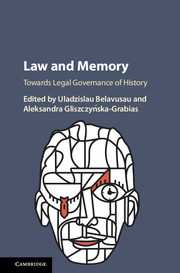(Source: Cambridge University Press)
Cambridge University Press has recently
published the book “Law and Memory: Towards Legal Governance of History”
BOOK
DESCRIPTION
Legal governance
of memory has played a central role in establishing hegemony of monumental
history, and has forged national identities and integration processes in Europe
and beyond. In this book, a range of contributors explore both the nature and
role of legal engagement into historical memory in selected national law,
European and international law. They also reflect on potential conflicts
between legal governance, political pluralism, and fundamental rights, such as
freedom of expression. In recent years, there have been numerous monumental
commemoration practices and judicial trials about correlated events all over
the world, and this is a prime opportunity to undertake an important global
comparative scrutiny of memory laws. Against the background of mass re-writing
of history in different parts of the world, this book revisits a fascinating
subject of memory laws from the standpoint of comparative law and transitional
justice.
TABLE OF CONTENTS
Introduction:
Memory Laws: Mapping a New Subject in Comparative Law and Transitional Justice
1 Uladzislau BELAVUSAU and Aleksandra GLISZCZYŃSKA-GRABIAS
Part I International Law 27
1 The United
Nations Human Rights Committee’s View of the Past 29 Antoon DE BAETS
2 The Role of
International Criminal Tribunals in Shaping the Historical Accounts of
Genocides 48 Marina AKSENOVA
3 The ‘Right to
Truth’ in International Law: The ‘Last Utopia’? 70 Patricia NAFTALI
Part II European Law (Council of Europe and the European
Union) 89
4 Kononov v.
Latvia as an Ontological Security Struggle over Remembering the Second World
War 91 Maria MÄLKSOO
5 Testing the
‘Uniqueness’: Denial of the Holocaust vs Denial of Other Crimes before the
European Court of Human Rights 109 Paolo LOBBA
6 Legislating
History: The European Union and the Denial of International Crimes 129 Luigi
CAJANI
Part III National Perspectives within the European
Union 149
7 Challenging
Historical Facts and National Truths: An Analysis of Cases from France and
Greece 151 Ioanna TOURKOCHORITI
8 Legal Silences
and the Memory of Francoism in Spain 175 Alfons ARAGONESES
9 Politics of
Public Knowledge in Dealing with the Past: Post-communist Experiences and Some
Lessons from the Czech Republic 195 Jiří PŘIBÁŇ
10 Adjudication
in Latvian Deportation Cases: References to International Law 216 Ieva MILUNA
11 Judging the
Conducător: Fascism, Communism, and Legal Discontinuity in Post-War Romania 228
Cosmin Sebastian CERCEL
12 Dealing with
the Past in and around the Fundamental Law of Hungary 246 Miklós KÖNCZÖL
13 On the
Politics of Resentment, Mis-memory, and Constitutional Fidelity: The Demise of
the Polish Overlapping Consensus? 263 Tomasz Tadeusz KONCEWICZ
Part IV Perspectives beyond the European Union 291
14 Defending
Stalinism by Means of Criminal Law: Russia, 1995–2014 293 Nikolay KOPOSOV
15 Cutting the
Umbilical Cord: The Narrative of the National Past and Future in Ukrainian
De-communization Policy 310 Lina KLYMENKO
16 Banning
Genocide Denial – Should Geography Matter? 329 Robert A. KAHN
17 “From Banning
Nakba to Bridging Narratives”: The Collective Memory of 1948 and Transitional
Justice for Israelis and Palestinians 348 Jeremie M. BRACKA
18 Historical
Revisionism and the Settler State: The Canadian Experience 374 Michael MORDEN
19 Defense of
Democracy and the Preservation of Collective Memory through Criminal
Legislation: The Challenges of Reconciliation in Peru 395 Salvador
HERENCIA CARRASCO
Epilogue: Beyond
‘Memory Laws’: Towards a General Theory of Law and Historical Discourse 413
Eric HEINZE
Index 435
For more
information, please visit the website
of the publisher.


No comments:
Post a Comment
Note: Only a member of this blog may post a comment.